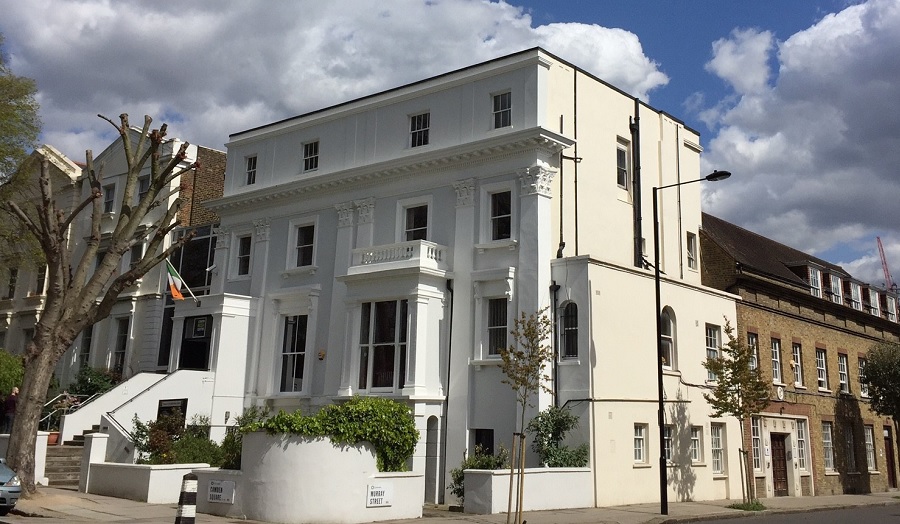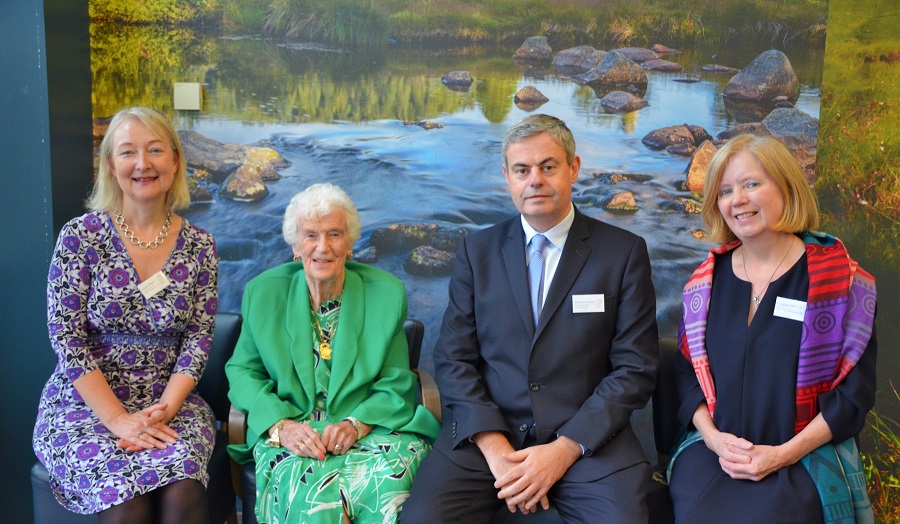Apply for this course
Please select when you would like to start:
If you're a UK applicant wanting to study full-time starting in September, you must apply via UCAS unless otherwise specified. If you're an international applicant wanting to study full-time, you can choose to apply via UCAS or directly to the University.
If you're applying for part-time study, you should apply directly to the University. If you require a Student visa, please be aware that you will not be able to study as a part-time student at undergraduate level.
Why study this course?
This degree course combines the insights of psychology with those of sociology, enabling you to better understand human behaviour and the different genetic, biological, individual, social and developmental factors that can influence it. You’ll have the opportunity to specialise in areas of interest, such as ethnicity, youth and workplace psychology.
Our psychology courses are ranked eighth in the UK for course satisfaction and ninth in the UK for teaching quality in the Guardian University Guide 2023.
Top five in the UK for student voice
This course was ranked in the top five in the UK for listening to the student voice according to the National Student Survey 2024
Top six in the country for satisfaction with feedback
Our psychology courses were ranked in the top six in the UK for satisfaction with feedback, according to the Guardian University Guide 2024
Study the best of both worlds
This degree course combines the insights of psychology with those of sociology, enabling you to better understand human behaviour and the different genetic, biological, individual, social and developmental factors that can influence it
Course modules
The modules listed below are for the academic year 2024/25 and represent the course modules at this time. Modules and module details (including, but not limited to, location and time) are subject to change over time.
Year* 1 modules
Year 2 modules
Year 3 modules
Child Development and Behaviour
(core, 15 credits)This module aims to introduce students to some of the most influential theories in developmental psychology. You will be introduced to some classic research that will help you to evaluate theories of development and their empirical basis. There will be the opportunity to examine and discuss existing developmental research in its historical and cultural context. The module also aims to provide you with the qualities and transferrable skills necessary for employment, including: written communication skills, digital literacy skills, the ability to contribute to discussions, independent study, time keeping, summation, evaluation skills, an understanding of the scientific method, and consideration of the ethical issues underlying research. The aims of this module are aligned with the qualification descriptors within the Quality Assurance Agency’s framework for Higher Education qualifications.
Cognition and Behaviour
(core, 15 credits)This module aims introduce students to some of the foundational theories in cognitive psychology, including a prehistory of cognition which considers earlier approaches to human thought and behaviour. Students will be introduced to classic research to help them to understand and evaluate theories of cognition in their historical and cultural context, and to key ethical considerations in this branch of psychology. There will be the opportunity to participate in classic experiments in seminars and workshops. This module provides students with opportunities to acquire key transferrable skills necessary for employment (e.g. written communication skills, digital literacy skills, discussion contribution, independent study and time keeping, summation and evaluation skills, and understanding of the scientific method and ethical research consideration). The aims of this module are aligned with the qualification descriptors within the Quality Assurance Agency’s Framework for Higher Education Qualifications.
Constructing Modern Societies
This module currently runs:summer studies - Thursday morning
autumn semester - Friday afternoon
(core, 15 credits)
This module introduces students to fundamental and essential concepts and theories of sociological thought and practice. It does this by exploring foundational thinkers and ideas of sociology, both in the historical context of their development and contemporary applications. The discipline of sociology is often said to be a discussion of modern times (Giddens), but what is meant by ‘modern’ and 'modernity’? What are the various transformations referred to by these terms and how have they shaped our current society, locally and globally? By inquiring into these and related questions students will be provided with a grounding in the key processes of modernity that informed and continue to influence contemporary life. Insofar as the discipline of sociology itself emerged through the investigation of these processes, students will also be introduced to canonical figures, theories and concepts of sociology.
Read full detailsPersonality
(core, 15 credits)The aims of this module are to allow students to:
(1) be aware of and understand classic and contemporary theories and models of personality in their historical and cultural context.
(2) understand how theory and research in this domain can help explain individual differences in behaviour in everyday life.
(3) think critically about different theories and assessment methods in personality psychology.
(4) be aware of ethical considerations in research on personality.
This knowledge and understanding will help students’ employment skills by enabling them to appreciate the different perspectives that are needed to fully understand individual behaviour in everyday life. The module develops students’ critical understanding of some key principles underlying psychological research (e.g., ethical principles and the historical and cultural specificity of research in personality psychology) that will facilitate progression to modules at levels 5 and 6. The aims of this module are aligned with the qualification descriptors within the Quality Assurance Agency’s Framework for Higher Education Qualifications.
Protest, Justice and Social Change
This module currently runs:spring semester - Tuesday morning
(core, 15 credits)
This module addresses the question of how societies change and who changes them. It focuses on the concepts of social history such as progress, development, and social evolution. It also addresses the ongoing debate of whether change is driven by individual agency or larger societal structures. In addition, the course examines the role of ideas and ideologies in shaping social change, focusing on concepts like freedom, equality, and justice. It discusses real world examples of social protests like anti-war, women's rights, and pro-life movements, as well as the study of how these movements – like the civil rights movement, Black Lives Matter, #MeToo, and Extinction Rebellion – form and spread. Lastly, the course covers the topic of revolutions and their impact on society by examining past revolutions – from the French Revolution to the Arab Spring – and the factors that contribute to their success or failure.
Read full detailsResearching Social Life
This module currently runs:autumn semester - Tuesday morning
summer studies - Tuesday morning
(core, 15 credits)
This module provides the foundation for an explicit, clear focus on social research throughout Sociology and related degrees, in addition to supporting students to acquire understanding of and skills in academic literacy. Some methodological principles and perspectives for effective social research are explained and also illustrated through exploration of research case studies. It will additionally provide experience in using the vast array of text, visual and statistical primary documentary sources and their interpretation for research. Research as a process will be examined including main empirical research approaches, the formulation and development of research questions and social, ethical and political contexts of research practice.
Read full detailsSocial Influences on Thinking and Behaviour
(core, 15 credits)This module provides students with an introduction to and understanding of key theories and models of social psychology in their historical and cultural context. It will help to develop students’ knowledge and understanding of the social psychological basis of behaviour. In particular, it will focus on different types of social influence and their impact on how individuals think, feel and behave in different contexts and domains. Classic social psychological studies will be discussed in their historical and cultural context to provide students with an understanding of how knowledge in this branch of psychology has evolved. The module also considers ethical issues with many of the classic studies in this branch of psychology and allows students to reflect on experimental procedures and their potential implications for psychological knowledge and society. In this way, the module develops students’ critical understanding of some key historical and contemporary themes and debate in this branch of psychology, which will facilitate progression to modules at level 5 and 6. This will also help students’ progression to employment or post-graduate study by enabling them to appreciate the different perspectives that are needed to fully understand individual behaviour in everyday life. The aims of this module are aligned with the qualification descriptors within the Quality Assurance Agency’s Framework for Higher Education Qualifications
Sociological Imagination
This module currently runs:spring semester - Friday afternoon
(core, 15 credits)
This module will provide you with the necessary intellectual skills for developing your sociological imagination. Week by week you will encounter a range of important insights into the social world that will enable you to identify, apply and evaluate sociological approaches, concepts and debates relating to the everyday situations.
The overall aim of the module is to allow you to see how sociology requires that we make the familiar world appear strange in order to see the workings of society below surface appearances. ‘Sociological Imagination’ will provide you with an introduction to constructing sociological arguments, thinking critically and assessing sociological evidence. The module discussions will allow you to explore a range of applications of sociological insights and theories in order to move beyond common-sense interpretations of society and to understand why ‘personal troubles’ must be grasped in relation to ‘public issues’.
Each week the module visits core sociological contexts including social class, inequality and exclusion; the city and urban sociology; power and surveillance; gender and bodies; popular culture and the arts; unconscious social forces; and religion and spirituality.
Read full detailsIndividual Differences
(core, 15 credits)The module introduces students to classic and contemporary theories and research in topics related to personality, intelligence, and psychometrics. The aims of this module are to provide students with an understanding of:
• key theories and models of personality, intelligence, and individual differences in their historical and cultural context;
• how these areas can be scientifically and ethically investigated using appropriate research methodologies (psychometrics);
• how knowledge of individual differences can be ethically applied to the ‘real-world’ and their relevance to a range of settings.
This will develop students’ knowledge and understanding of this branch of psychology, which will be beneficial in future work and training. The module also fosters skills in the development of psychological assessment, academic argument and critical evaluation.
Qualitative Social Research
This module currently runs:spring semester - Thursday afternoon
(core, 15 credits)
This module will analyse the use and challenges of qualitative research in sociology. It will start with the wide exploration of the theoretical underpinnings of qualitative research, including its strengths and limitations, as well as the various qualitative research methods. Further, this module will analyse the main skill set essential for a qualitative researcher, as well as the potential difficulties that might occur, i.e. bias. The last part of this module will look at NVivo, the practical tool for qualitative data analysis.
Read full detailsQuantitative Social Research
This module currently runs:autumn semester - Thursday afternoon
(core, 15 credits)
This module analyses the research process in relation to quantitative methodologies from the formulation of a research problem through appropriate collection and analysis of data to the writing-up of results in the form of a research report. The module sets out the research contexts in which this methodology is appropriate and discusses the skills and limitations associated with surveys as an important research method in sociology. At the same time, the module introduces students to British Social attitudes as one of the main quantitative data sets on social attitudes in the UK.
Read full detailsSelf and Society
This module currently runs:autumn semester - Friday morning
(core, 15 credits)
This module introduces students to some of the key sociological approaches used to explore and explain the sociological notion of ‘self’. This will involve an examination of a range of major 20th century sociological thinkers on the nature of the social construction of self – eg. Mead, Goffman – and it’s constrains – e.g. Marx and Parsons. The intention is to use some of the major sociological theorists and apply their insights into current concerns with the ‘project’ of self and identity. That is, to examine how much choice we have in becoming who we are.
Read full detailsSocial and Cultural Understanding of Us and Others
(core, 15 credits)This module examines social perception and behaviour in terms of how individuals think about and seek to understand their social world through their interactions with others at the group and societal levels. The module will provide students with an understanding of:
• key theories and models of social psychology in their historical and cultural contexts;
• how these areas can be scientifically and ethically investigated using appropriate research methodologies;
• how knowledge of social psychology can be ethically applied to the ‘real-world’ and their relevance to a range of settings.
This will develop students’ employability by providing a basis of knowledge and understanding which will be beneficial in future work and training (e.g. understanding the underlying dynamics of interpersonal and intergroup relations) and foster skills in the development of psychological assessment, academic argument and critical evaluation.
Sociology of Everyday Life
This module currently runs:spring semester - Friday morning
(core, 15 credits)
In this module you will learn to apply sociological understanding and methodology of observing and explaining the everyday life: its routines, rhythms and those aspects of social life that we consider familiar and known. You will be able to see the strange in the familiar, learning the practice of sociological thinking. You will be asked to suspend any taken for granted assumptions about the rules and routines of social life, and look at everyday behaviour from the perspective of an external observer. You will learn how everyday life has come to be theorised and understood by key sociological thinkers. Alongside this, you will learn about sociological approaches to topics such as home, eating, shopping, emotions, embarrassment, shame and romance.
Read full detailsCognition
(option, 15 credits)The aims of this module are to provide students with an understanding of the (1) internal representations and processes underlying cognition; (2) key theories and models of cognitive psychology and related research in their historical and cultural contexts; (3) how these areas can be scientifically and ethically investigated using appropriate methodologies; and (4) how knowledge of cognitive psychology can be ethically applied to the real world and their relevance to a range of settings. This will help develop students’ employability by providing a basis of knowledge and understanding which will be beneficial in future work and training (e.g. understanding reasoning and factors affecting decision making). This module also fosters students’ ability to critically and academically evaluate theoretical arguments.
Development Across the Lifespan
(option, 15 credits)This module focuses on how human behaviour changes across the lifespan, emphasising changes in thinking and cognition during childhood and beyond. Development across the lifespan will consider historical context, research across the world and emphasise the importance of cross-cultural research in developing universal theories of child development.
Living on the Margins
This module currently runs:spring semester - Monday afternoon
(option, 15 credits)
This module draws on previous modules relating to inequality and social division. The emphasis is on various marginalised groups in society, including, but not limited to, families with children, people with disabilities, ‘race’/ethnicity, elderly, and members of the LGBTQI+ community. It looks into various areas of life where these societal groups are more at risk than others, such as increased health and wealth inequalities, and inequalities in education. It also looks into various policies aimed at supporting these groups in order to achieve a more equal society. Whilst focus is mainly on marginalised groups in London, it equips the students with skills and knowledge on marginalised social groups that can be applied on national level as well.
Read full detailsPsychology and Employment
(option, 15 credits)This module provides students with the opportunity to critically consider the nature of employment, including issues related to inclusion in the workplace and to consider alternative (e.g. anti-racist) ways of working. They will assess, reflect upon, and develop their own employability skills, attributes and attitudes. Students will be introduced to self-assessments, career planning tools, and digital resources that will support this process. The module provides students with the opportunity to apply their psychological knowledge ethically in an employment context, and to identify and plan for their ongoing training and development needs.
Society at the End of Days
(option, 15 credits)Many are those who fear that the end of the world and/or life as we know it is nigh. But what is meant by this, what is driving these views, and what impact does the spectre of society’s end have on us today, or should? In this module we will explore several versions of ‘end times’, such as: religious stories of apocalypse; the threat of catastrophic nuclear war (‘mutually assured destruction’); climate devastation via global warming; the ascendency of ‘artificial intelligence’; philosophical nihilism and socio-political theories about the ‘end of history’. Our aim will be to see what can be learnt by investigating how humans have variably imagined the end(s) of society – a pastime that has become increasingly prevalent since the Covid-19 pandemic. What do these stories and theories tell us about ourselves, about our hopes/fears for the future and what we hold sacred? What actions do they prompt – or perhaps more worryingly fail to – and why?
Sociology and Current Affairs
This module currently runs:autumn semester - Tuesday morning
(option, 15 credits)
In this module you will learn to apply a range of contemporary social theories and concepts to the understanding of current affairs. The module will provide you with the conceptual tools to critically assess representations of social groups and events in virtual and print media and other portrayals of contemporary social life, political events, and social issues. The module will allow you to develop a conceptual toolkit drawn from semiotics, phenomenology, post-structuralism, among others, to explore representations of difference and power and to appreciate how they acquire ‘newsworthiness’. You will learn how to view current affairs – ranging from coverage of debates on global poverty and social exclusion to migration and terrorism – through a sociological lens in order to look beyond the spectacle or apparent banality of the news.
The module will contribute to the development of your practical skills in critical analysis by exploring [a] the way that social issues are represented for public consumption; and [b] the value of applying social theory to achieve in-depth interpretations of events and roles of social actors. In an age of multiple media platforms, the ‘quick news fix’ of social media, and the proliferation of fake news, ‘Sociology and Current Affairs’ will encourage you to develop and use innovative and imaginative approaches to gain and communicate better understandings of the complexity of the world around us.
Read full detailsUnderstanding Gender and Sexuality
This module currently runs:spring semester - Thursday morning
(option, 15 credits)
This module introduces students to the key concepts and theories relating to the social construction of gender and sexuality and their application to a range of social sectors and issues in the UK and abroad. This module addresses the ways in which gender and sexuality are both constitutive of the social and are established through social structures, institutions and interactions. Drawing on intersectional approach, this module will explain the ways in which theories of gender and sexuality inform the sociological study of the family, work, health, education, crime, the welfare state and politics, media and the body. To this end, the approach to gender and sexual discrimination and inequalities will be made in connection to other forms of social identity, including class, race and ethnicity.
The aims of the module are to:
• Introduce and critically analyse key concepts in the sociological theories of gender and sexuality;
• Understand how the notions of gender and sexuality impact all levels of social structures, social relations and social identities;
• Address the intersections between gender, sexuality and other forms of social identity and difference, including class, race, ethnicity.
• Consider the conceptual framework for the persistence of discrimination and inequalities on the basis of gender and sexual orientation.
Understanding Racism and Ethnicity
This module currently runs:autumn semester - Friday afternoon
(option, 15 credits)
Accusations of racism and ethnic discrimination are seemingly everywhere, in the workplace, in the streets, in everyday interactions. You will wonder what is exactly meant by racism and ethnicity, whether this are beliefs about racial and ethnic subordination or it is rather found in social interactions. This module addresses various theories of racism and ethnic discrimination, and critically assess the challenges revolving around the political and social hostile environment against racialised minorities in specific, socio-political contexts in the UK. This module goes beyond the Eurocentric ideas that have dominated sociological thinking and will apply more-diverse and -inclusive theoretical frameworks to the interconnectedness among issues of race, ethnicity, social class, gender, age, drawing on the principles of social justice and empowerment.
Aims. This module will provide key skills and knowledge that will enable you to:
• Analyse critically key concepts including racism and ethnicity as well anti-racism, multiculturalism, Islamophobia in order to develop an awareness of their contested nature.
• Look at these issues in the hostile environment against racialised groups, exploring the meanings ascribed to these terms, historical origins and key examples where these issues have been or remain important in shaping contemporary British society.
• Consider the impact of racist and ethnic discrimination on specific groups, including women, religious and ethnic groups.
Youth in Modern Society: Consumers, Deviants and Rebels
This module currently runs:autumn semester - Thursday morning
(option, 15 credits)
In the current period a plethora of youth resistance actions, movements and subcultures
have developed in response to socio-economic deprivation on a global scale. From
youth riots to graffiti writers in the UK to the politicised Latin Kings and Queens gang in New York, young people are developing cultural, political and deviant responses to their dispossession and exclusion. In this module we will focus on case-studies and theories of youth social, cultural and deviant resistance over time. Questions of race/ethnicity, class, gender and age will be addressed as we explore the e meanings and representations of youth reactions to industrial and post-industrial societies.
This is a an interdisciplinary module which combines the perspectives from sociology, ciminology and cultural studies to address contemporary youth experience.
Read full detailsConversations in Sociological Thought
(core, 15 credits)This module addresses the decolonial encounter in contemporary sociology. Following an initial revisiting of the foundations of social theory, the module invites you to critically explore sociology ‘beyond the Western Canon’ and its roots in Eurocentrism to develop a decolonised sociological imagination. The aim of the module is to develop an ongoing conversation in contemporary social thought rather than viewing contesting perspectives as an insurmountable challenge. In short, you will explore the perceived limits of Eurocentrism and assess the need to rethink the basis of sociology’s conceptual knowledge and vocabulary.
You will reconsider enduring sociological problems such as ‘alienation’ and ‘anomie’ alongside the work of theorists such as Frantz Fanon and other postcolonial writers; explore the biopolitical disciplining of the social body via a conversation between the ideas of Michel Foucault and Achille Mbembe; assess the continued relevance of Simone de Beauvoir’s feminist theory compared to the critical intersectionality of Patricia Hill Collins.
‘Conversations in Sociological Thought’ will enable you to reassess the value of the Eurocentric traditions of sociology by addressing critical questions at the core of classical and contemporary social thought through a reflexive exploration of intersubjectivity, bodily practice, race, and gender in the contexts of past and contemporary social experience.
Living Theory
(core, 15 credits)In this module we will explore and apply important theories and concepts in contemporary social theory for the purpose of enhancing our understanding of the world we live in. Through the work of contemporary social thinkers, the module will examine and test out the ways in which social theories and concepts are ‘live’ – not dead or irrelevant abstractions of little consequence, but a living and crucial part of how people understand reality and navigate its vicissitudes. This will support your learning in other modules, and post-university, by deepening your understanding of key theoretical frameworks for analysing social phenomena and enhancing your ability to apply them.
Psychology and Sociology Dissertation
This module currently runs:all year (September start) - Tuesday afternoon
(core, 30 credits)
The students carry out an in-depth piece of a research and analysis in an area of their choice that is analysed from both sociological and psychological perspective. The students will use theoretical and empirical knowledge, research and analytical skills gained in their programme of study to investigate the topic and formulate a dissertation.
Read full detailsClinical Psychology
This module currently runs:autumn semester - Monday morning
(option, 15 credits)
This module aims to develop your knowledge and skills in clinical psychology. You will learn about key theoretical approaches in clinical psychology and how clinical conditions are diagnosed and treated (e.g., mood and anxiety disorders; substance use disorders; personality disorders; post-traumatic stress disorder). You will also develop core skills required to working ethically with clients with complex needs and learn policy and legislation on issues such as safeguarding, the Mental Health Act, and the Mental Capacity Act. You will develop a critical understanding and practical experience in using psychometric assessment and diagnostic methods, including the Diagnostic and Statistical Manual for Mental Disorders, 5th Edition (DSM-5), and range of clinical skills which will ease your transition into postgraduate training and employment in different professions.
Read full detailsCognition and Emotion
This module currently runs:spring semester - Monday afternoon
(option, 15 credits)
This module will allow you to critically engage with classic and contemporary cognitive models and theories of emotion in their historical and cultural contexts. The module will allow you to evaluate the extent to which these models and theories can be integrated into a common framework capable of explaining both adaptive and maladaptive emotions. Additionally, you will build on previous critical reading skills and discussion: some sessions will require prior reading of research papers and discussion of these in class time, thus encouraging active participation from you and thus instilling confidence in communicating your views to others. Communication skills will be supported via different presentation methods, thus supporting the graduate skills expected of you in the workplace.
Read full detailsComparative and Global Social Policy
(option, 15 credits)This module focuses on different welfare state regimes/clusters, with emphasis on the relationship between the four pillars of welfare provision. It also provides the student with knowledge in how to make international social policy comparisons. It also focuses on the broader political, social and economic context in which social policy is constructed and implemented.
Counseling Psychology
This module currently runs:spring semester - Monday morning
(option, 15 credits)
The aim of this module is to introduce you to the discipline of counselling psychology, exploring its origins, scope, training, and contexts for practice. You will explore the philosophy, values and ethics of counselling psychology including contemporary debates and issues within the profession. You will learn about the three dominant therapeutic modalities in counselling psychology practice (cognitive-behavioural, person-centred/humanistic, and psychodynamic modalities) and the theoretical and empirical evidence underpinning these modalities. You will gain knowledge and practical skills in areas such as clinical assessment, formulation, treatment planning, interventions, self-reflection, and the therapeutic relationship. The knowledge and skills developed in this module will leave you well positioned to progress to further training required to practice, including the MSc Counselling and Psychotherapy.
Read full detailsCyberpsychology
This module currently runs:autumn semester - Thursday morning
(option, 15 credits)
The aim of this module is to develop your knowledge and understanding of key topics in cyberpsychology. The module will introduce you to emerging lines of theory, research, and practice in this this branch of psychology, including social influence and communication; artificial intelligence; love and relationships online; and forensic cyberpsychology. It will provide opportunities for you to develop your knowledge and skills in different methods used to investigate core and emerging topics cyberpsychology and the associated ethical implications. You will also gain a critical appreciation of how psychological theories can be effectively applied in the area of human-computer interaction. The module will thus equip you with the knowledge and skills necessary for further study in cyberpsychology and employment in various professional contexts.
Read full detailsEmpowering London: Working within the Community
This module currently runs:all year (September start) - Friday morning
all year (September start) - Wednesday afternoon
(option, 15 credits)
A new innovative module combining work based learning and a radical model of critical and transformative citizenship. This module has been developed to allow you to work intensively with a London community project/organisation in order to identify (in partnership with them) a challenge they are faced with and work towards positively addressing this challenge This innovative module is an exciting opportunity to work at a grass-roots level to effect change and to learn about the key issues currently affecting London and other large cities.
We live in the sixth wealthiest economy in the world, and London produces 22% of all Gross Domestic Product (GDP). However, we also have a significant problem with inequalities and wealth distribution. The current poverty rate in the UK is 22% and in London this is even higher at 28%.
As of July 2020 there have been 79,437 violent crimes in the last year resulting in injury in London and 152 homicides. Included within this, there has been a steady increase in incidents of serious youth violence, with latest figures showing 8,151 young victims. This is despite concerted efforts to better support young people. The COVID-19 lockdown raised awareness of the prevalence of domestic violence, however, even before lockdown London was seeing a steady increase with reported cases rising from 75,159 in April 2016 to 91,226 in June 2020.
London's health inequalities are created by social, geographical and biological factors. The difference between highest and lowest healthy life expectancy in areas of London is 15.7 years based on Public Health England data. Contributing factors include infant mortality, excess weight, physical activity, smoking, homelessness and disease.
We are facing a global climate and ecological crisis, and London is a case in point. As the capital’s population grows to 11 million by 2050, addressing problems of polluted air, water stress, poor access to public greenspace, and the effects of climate change, such as overheating and flooding, will become increasingly urgent. London therefore has ambitious targets to meet WHO air quality guidelines by 2030, become carbon neutral by 2050, and become half greenspace and have 12% more tree cover by 2050.
However, at the same time the scope for local authorities to address these issues has been reduced by heavy pressures of austerity and a neo-liberal policy agenda. Many local community voluntary organisations are left with a vacuum to compensate for.
As a university and ‘anchor institution’ to the London economy, we believe it is our role to help ‘Empowering London’. This module has been designed to empower you as our student by learning about some of the challenges facing our city and to contribute to addressing this via work based learning. Our fundamental aim is to help you become a values driven graduate who can make a positive difference to society. This module will provide you with some of the tools to achieve this goal.
The module is designed to enhance your wider personal and professional development. It will facilitate application and progression of knowledge gained via your studies and wider life experience. The module includes values-driven, professional training and work experience to assist in preparing you for your individual future career. Through work based practice, you will positively contribute to a key part of the University’s Strategic agenda, addressing current social and economic issues facing London communities. This unique module allows you to be challenged by contributing to current, real world projects, working with the University and students from other professional disciplines to make a positive difference to society.
The initial stages of this 15 credit, year-long module will introduce you to a range of professional skills and techniques, including: reflective self-assessment; preparation for employment as a values-driven graduate within inclusive work environments; becoming an ethical leader; being a critical employee and developing approaches for co-operative and collaborative working.
You will then be introduced to employment experience opportunities supporting organisations and/or individuals in the local community. This could include working with communities and organisations towards programmes aiming to address collective identity and civic agency in neighbourhoods. The London Met Small Business and Charities and Social Enterprise Clinics, will additionally provide suitable opportunities for placements. You will work individually or in teams, in partnership with community institutions to support the activities of one of London Met’s strategic priorities - the Empowering London initiative. Your practice will positively contribute to addressing the challenges facing London which impact everyone’s lives.
The module has been co-created with students and ongoing feedback will be sought from a range of students on an ongoing basis.
The module aims to enable you to:
● Effectively express and understand your current skills and abilities in relation to your career values and goals
● Practically apply the knowledge gained through your course programme to a work/neighbourhood environment
● Make a positive contribution to the challenges of current social and economic issues facing the University’s local communities and consider these from national and global perspectives
● Gaining unique insight of current challenges facing cities in the areas of social wealth; the environment; discrimination; health; poverty and deprivation and crime and partner with community institution to design potential solutions
● Gain understanding and direct experience of the graduate level skills, knowledge and insights required for inclusive practice and problem resolution within institutions to enable you to become an inclusive leader in society
● Recognise your personal and professional development through your work based practice and how to apply the experience and knowledge gain to your future goals
Forensic Psychology
This module currently runs:autumn semester - Monday afternoon
(option, 15 credits)
This module introduces you to classic and contemporary theory and research in Forensic Psychology on topics such as the causes of crime; the impact of crime; types of offences and offenders (e.g., mentally disordered offenders; violent offenders); the prosecution and outcomes of crimes; the psychology of the court room and criminal justice system; treatment of victims in the criminal justice system; and the rehabilitation of offenders. It will develop your ability to apply theoretical perspectives from different branches of psychology and criminology to the study of contemporary issues in the criminal justice system, including systemic injustices in the system. It will provide you with opportunities to develop critical knowledge and skills in areas such as risk assessment, treatment planning for offenders with complex psychological needs, and specialised areas such as cybercrime and stalking. These outcomes will leave you well positioned to progress to postgraduate training and employment in varied forensic and criminal justice settings.
Read full detailsGender Politics
(option, 15 credits)This module explores the ways in which gender and sexual inequalities and violence reproduce through policies and practices impacting social structures and institutions, such as family, work environment, health system, education, criminal law, the welfare state, and media. Drawing on transnational and intersectional perspectives, this module looks to how the lack of gender perspective exacerbates inequalities and dynamics of violence in several contexts, such as education, migration, media and health. To this end, this module traces feminist debates concerning women’s and men’s role and under-representation in politics, policies and practices perpetuating dynamics of violence against women (domestic violence, femicide) and/or the criminalisation of homosexuals in several hotspots. With a focus on the global, this module offers new perspectives on the political process, both formal and informal, impacting women and sexual minorities and sheds light on the way that gender power is unevenly distributed in global society.
The aims of the module are to:
- Critically analyse how gender and sexual inequalities reproduce in policies and practices in global hotspots.
- Address how discriminatory policies and practices impact all spheres of life, including family, work environment, health system, education, criminal law, the welfare state, and media in several global settings.
- Understand how under-representation of women and sexual minorities in politics perpetuate dynamics of violence against women and the criminalisation of homosexuals in several hotspots.
- Consider the intersections between gender and sexuality and class, racial and ethnic inequalities in the study of gender perspective in politics.
Health Psychology
This module currently runs:autumn semester - Tuesday morning
(option, 15 credits)
The aim of this module is to introduce you to Health Psychology as an applied area within the discipline of psychology. You will develop core skills related to appraising key perspectives and approaches in Health Psychology and in evaluating assessments, explanations, and treatments that are applied to a range of health-related issues. You will have the opportunity to investigate the role played by physiological, psychological, social, and cultural mechanisms in the causation and treatment of physical illnesses. You will gain experience in constructing a health promotion leaflet and an accompanying rationale, thus providing additional transferable skills for future employment. The aims of this module have been developed in accordance with NICE guidelines and the British Psychological Society (BPS) codes of conduct and ethics. The module will thus allow you to make informed and realistic decisions about future training and employment in this and related branches of psychology.
Read full detailsHomelessness and Housing Policy
This module currently runs:autumn semester - Thursday morning
(option, 15 credits)
In this module, you will look at one of the most pressing social issues in the UK today – that of the cost and shortage of housing and of the shortage of affordable housing in particular. Living in a safe, comfortable and secure home is a human right, essential to our wellbeing. However, it is widely agreed that we have a housing crisis in the UK. This crisis is perhaps especially acute in London but it is a crisis which affects much of the country. Over the past ten years, the cost of housing, including rents in the private rented sector have spiralled while the number of social rented homes has continued to fall and the numbers of people who are homeless or living in temporary accommodation has risen. In this module, you will look at the scale and at the underlying causes of the housing crisis in the UK. You will look at the shortage of affordable housing, the growth of the private rented sector and at the collapse of social rented housing. You will also look at how access to housing and the housing market reflects wider social divisions in terms of class, ethnicity and gender. The module places housing and housing policy at the core of our understanding of society, social divisions and social policy.
The module focuses on housing policy and on social housing, looking at the history of social housing in the UK and at changes in housing policy since the 1980s. The module also looks at the growth of homelessness and at the underlying causes of the growing level of homelessness. You will look at homelessness policy, at good practice models of how to tackle homelessness and at the link between housing and poverty and the importance of both housing and welfare policy as instruments of poverty reduction.
The aims of the module are to:
- understand what the housing market is and how it works
- develop an understanding of the problems in accessing decent housing in the UK, how widespread the problems are, which groups suffer most and why these problems appear to have worsened over recent years
- develop data handling and data analysis skills to collect and analyse relevant data on housing and the housing crisis in the UK
- develop and demonstrate an understanding of housing policy and housing policy changes in the UK
- develop policy analysis and policy evaluation skills
- understand how the housing market reflects the different economic and political ideologies which shape housing policy
Human Rights and Conflict
This module currently runs:spring semester - Thursday morning
(option, 15 credits)
You will develop an understanding of the international human rights framework and consider debates and theories challenging this framework (including a critical assessment of the concept and implementation of the universality of human rights). The module will enable you to evaluate various international conventions on the protection of human rights, including the Universal Declaration of Human Rights. The module will examine violations of human rights in the light of various social and political contexts across the world and gain an understanding of how human rights applies in specific contexts; how such violations impact societies, communities and individuals; and how individuals and organisations work for justice in such harrowing circumstances. In addition, the module will explore issues surrounding cases of historic injustice relating to human rights abuses and atrocities committed in conflicts.
Read full detailsRacism in the Global Context
(option, 15 credits)This module explains the ways in which race and ethnicity have become a method for labelling humanity worldwide. This module will enable you to explore the intersections of race, ethnicity, and politics in the global context and will enable you to understand how anti-racist theories and ideologies dismantle both racial categories and discriminatory social norms against people globally. We will do so by exploring the current struggles against the reminds of imperialism and colonialism, as well as other forms of racial domination, human control and content in contemporary Europe, the US and the Global South, e.g. India and Latin America.
This module aligns with London Met’s mission in advocating for human rights and tackling inequalities impacting racialised groups in society. This module will encourage to go beyond the Eurocentric ideas that have dominated sociological thinking and to apply more-diverse and -inclusive theoretical frameworks to the interconnectedness among issues of race and ethnicity, gender and/or class discrimination, drawing on the principles of social justice, human rights and empowerment in contemporary world.
Aims. This module will provide key skills and knowledge that will enable you to:
- Critically analyse the foundations of racial and ethnic discrimination
- Address the meanings ascribed to race and ethnicity in the political approach to for example the human rights of irregular migrants and/or ethnic minorities (e.g. indigenous people) in the European context
- Consider racial and ethnic politics and tensions, representational and identity politics, and electoral outcomes in the Americas • Familiarise yourself with colonial legacies and independence, migration and humanitarianism in Africa• Know about citizenship and multiculturalism, the impact of mass tourism, international business, and intersections of race and gender discrimination and violence in Southeast Asia
Religion and the State
This module currently runs:autumn semester - Monday morning
(option, 15 credits)
This module will provide students with an opportunity to engage with contemporary debates on the relationship between religion and the state and sources of religious intolerance. Students will be required to critically examine the ideas of the classic and contemporary social scientists on religion and explore the application of their ideas to an ever-changing world. Overall, the aim of the module is to develop the students’ capacity to utilise social scientific concepts and perspectives in their analyses of religion in contemporary society. The disciplinary focus of the module will, initially, be the sociology of religion. The application of a range of social scientific approach will also be introduced - historical, political, economic and social psychological approaches.
Read full detailsSpecial Topics in Personality and Social Psychology
(option, 15 credits)The aims of this module are to (1) provide students with an advanced understanding of developments in theory and research in (a) personality and individual differences and (b) social and cultural psychology; (2) introduce alternative and challenging perspectives on mainstream psychological phenomena; (3) develop and extend students’ understanding of the application of psychological theory to contemporary social issues; (4) facilitate understanding of the historical and cultural specificity of theory and research. The module will enhance students’ employability through knowledge of alternative perspectives on taken-for-granted explanations of psychological phenomena; provide a deeper understanding of how individual, social and cultural factors can influence personal and social wellbeing; provide skills relevant to the application of theoretical knowledge and critical evaluation. The aims of this module are aligned with the qualification descriptors within the Quality Assurance Agency’s Framework for Higher Education Qualifications.
Specific Learning Differences
This module currently runs:spring semester - Wednesday morning
(option, 15 credits)
The aim of this module is to introduce you to a range of Specific Learning Differences (SLDs), including autism spectrum disorder (ASD); attention deficit hyperactivity disorder (ADHD); and dyslexia. You will learn how these learning differences are diagnosed and how they impact cognition, behaviour, and education. You will develop a critical understanding of the theoretical and evidential basis of diagnosis and treatment methods for different SLDs. You will have opportunities to consider the lived experience of individuals with SLDs and significant others (e.g., relatives, teachers), recognising that an individual’s strengths and difficulties will present differently and may change depending on the task or the environment. You will also develop essential skills in ethical and inclusive practice when working with people with SLDs. The knowledge and skills developed in the module will help to prepare you for further study and employment in various professional contexts.
Read full detailsWork Psychology
This module currently runs:autumn semester - Thursday afternoon
(option, 15 credits)
The aim of this module is to develop your understanding of a range of theories, models, and lines of applied research in work contexts. Working with hypothetical organisational case studies you will develop skills in applying psychological knowledge to the understanding of client needs and learn how to provide solutions to address a range of issues in organisational and work-related contexts, while considering aspects of ethics and safety. You will be invited to reflect on the way that work can entrench or challenge societal power structures through examining domains of work which are traditionally neglected by organisational psychology. In this way, you will be encouraged to develop a critical stance towards dominant discourses of hierarchical organisational power structures. You will thus appreciate and learn how to address issues faced by underrepresented and marginalised occupational groups and how to harness the benefits of diversity in the workplace. The knowledge and skills developed in this module will enhance your opportunity to enter postgraduate training and employment in different professions (e.g., in business, organisational or occupational psychology; human resource management).
Read full details





.jpg)













